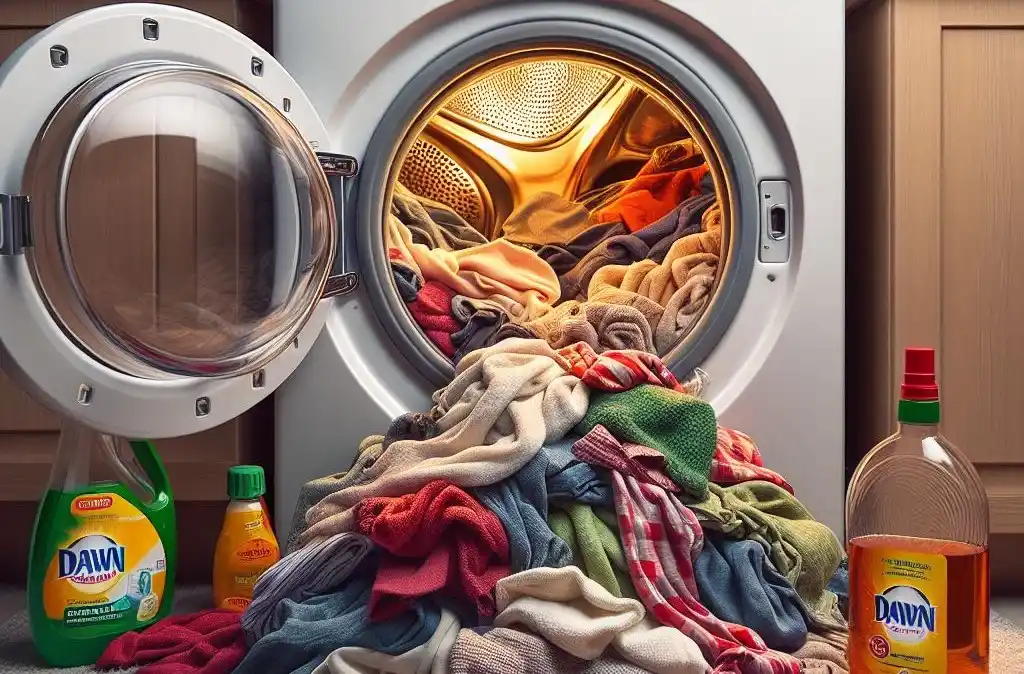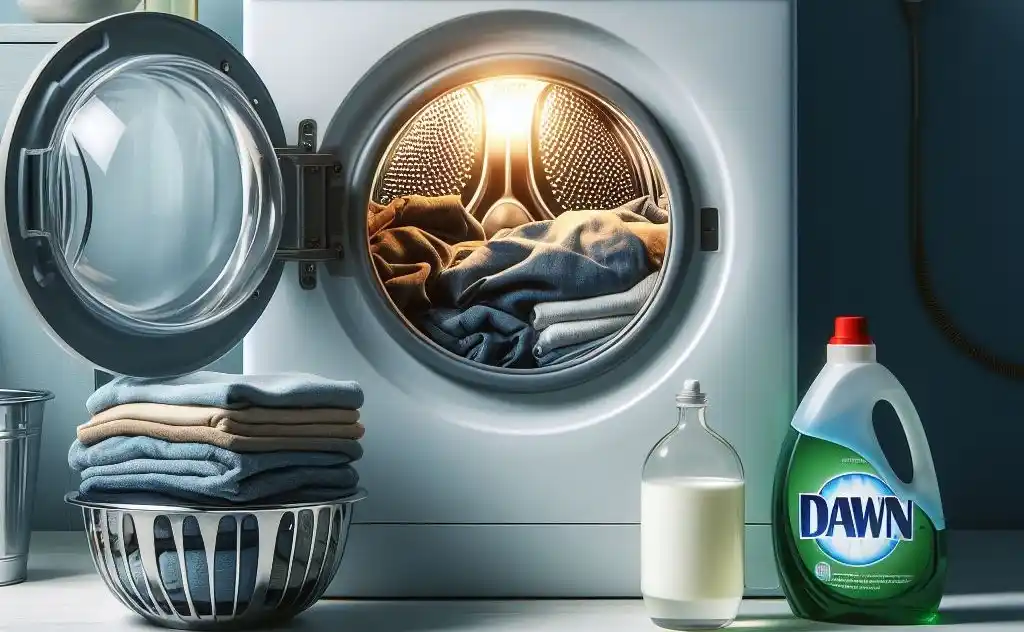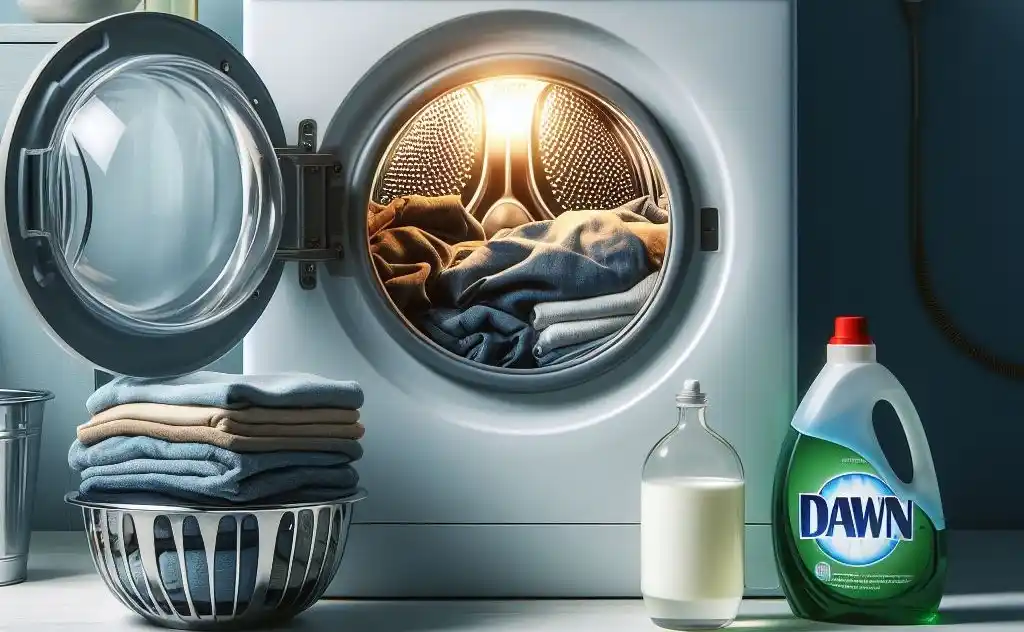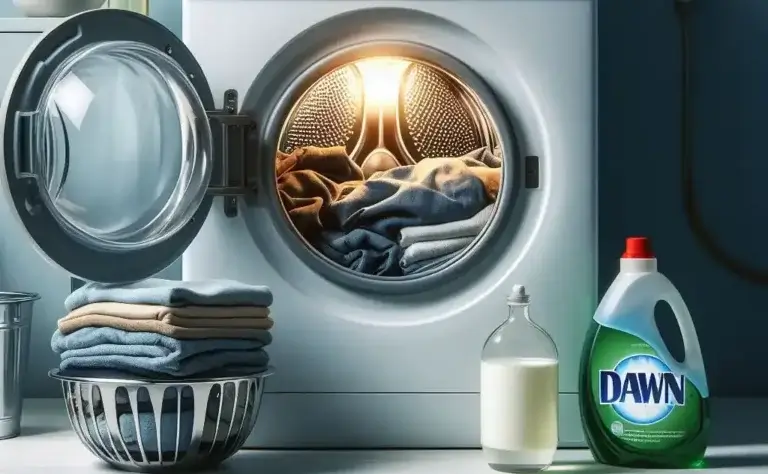Vinegar and Dawn in Washing Machine: A Complete Guide
Are you looking to get your clothes extra clean or remove tough stains? Have you heard that adding vinegar or dawn dish soap to your washing machine can help?
You’re not alone. Many people swear by adding extra ingredients like vinegar, baking soda, and dish soap to their laundry for added cleaning power. But is it effective and safe for your machine?
In this comprehensive guide, we’ll cover everything you need to know about using vinegar and dawn in washing machine to better understand if and when they should be used:
Table of Contents
An Introduction to Using Vinegar and Dawn in the Washing Machine
Adding household ingredients like vinegar and dish soap to your laundry seems enticing. Who wouldn’t want an easy way to boost their detergent’s stain-fighting power or get rid of funky odors in their washing machine?
While the idea is tempting, there are some important things to consider before dumping anything extra into your wash. Let’s look at the proposed benefits and potential risks:
Suggested Benefits
- Cleans the washing machine – removes soap scum, hard water buildup, residue
- Deodorizes – eliminates odors in the washer or on clothes
- Acts as a fabric softener
- Boosts the cleaning ability of detergent
- Helps fight stains and whiten
Potential Risks
- Could damage machine components or seals over time
- Might not properly rinse out leading to residue on clothes
- Can cause excess suds leading to overflow
- Potential skin irritation or reactions
- Unknown effect on fabric integrity with repeated use
Now that we know the main claims behind these laundry “hacks” and the possible downsides, let’s look closer at vinegar and Dawn specifically.
Using Vinegar in the Washing Machine

First up, distilled white vinegar. This mild acid is often promoted to help with laundry for the following reasons:
Suggested Benefits of Vinegar
- Removes soap scum and hard water mineral deposits inside the drum
- Deodorizes the washing machine; eliminates musty smells
- Acts as a fabric softener to keep towels soft
- Helps brighten whites and fight stains
- Rinses cleanly without residue on clothes
Vinegar is indeed a great degreaser and very effective for dissolving mineral deposits from hard water. So this makes it an ideal cleaning agent for the inside of your washing machine.
Vinegar is also used as a rinse aid – helping to remove any traces of soap or detergent after the wash cycle.
This means it could allow you to skip fabric softener and leave your laundry clean and soft instead of stiff and crunchy.
But does vinegar actually “boost” the cleaning power of your regular detergent as some people claim? And is it safe for all types of fabric? Let’s explore further.
Is Adding Vinegar to Laundry Safe?
While vinegar has some benefits for laundry, there are also some potential downsides:
- Can degrade elastic fibers and rubbers over time – not good for underwear, bras, swimwear longevity
- Not recommended for delicates or silk which could lose shape
- Repeated use could prematurely wear out components of the machine
- A pungent odor of vinegar may linger on clothes if not properly rinsed out
The acidic nature of vinegar helps dissolve hard water deposits and soap scum on a short-term basis. But long-term it could damage parts like hoses and seals that are not designed for that level of acidity.
The key is dilution and moderation. Occasional use of vinegar for cleaning a washing machine itself or as a deodorizer rinse for towels is generally not a problem. You just wouldn’t want to put vinegar in every load of laundry you ever do.
Moderation is key if you want the benefits without premature damage to fabrics or your machine.
How Much Vinegar to Use in Wash?
When it comes to the amount of vinegar needed, recommendations typically range from 1/2 cup to 1 full cup per “large” load. You can scale down for smaller loads.
It is best to add it directly to the drum and run a rinse cycle at the end. Or you can add vinegar to the dispenser meant for fabric softeners. Just be careful not to mix it directly with undiluted detergent or bleach to avoid chemical reactions.
Summary of Vinegar Uses
Cleaning Washer Itself: Once monthly – pour 2 cups vinegar into the empty drum, run the hottest cycle possible, then do an extra rinse cycle after to clear any vinegar smell.
For front-loading HE machines, pour 1-2 cups of vinegar directly into the drum. Then run a wash cycle on the longest, hottest setting with no clothes/detergent. Wipe down any visible surfaces and leave the door open after to dry out completely.
Deodorizing Laundry: Half cup distilled white vinegar instead of fabric softener for towels/sheets. Add to dispenser or drum directly. (Avoid use on delicate fabrics.)
Brightening/Disinfecting Whites: Add 1 cup to the wash cycle for bold whites. Best for cottons and linens only.
All-Purpose Rinse Half a cup of vinegar as a final rinse for most loads to increase softness and remove residue. Skip if sensitive skin.
Pros of Using Vinegar in Wash
- Effective cleaning agent and degreaser
- Helps remove hard water buildup and soap scum
- Deodorizes washer and laundry without harsh chemicals
- Fabric softener alternative for towels/sheets
- Enhances brightness of whites
Cons of Vinegar for Laundry
- Can degrade elastic, latex with repeated use
- May damage washer components long-term
- Not suitable for delicates or some fabrics
- Can cause skin irritation for sensitive types
So in summary – vinegar has some great cleaning uses for laundry in moderation. But take care with dilution and frequency to avoid damage or unwanted residue on clothes.
Next up – let’s examine if using dish soap like Dawn for laundry is a good idea or not.
Should You Use Dawn Dish Soap in the Washing Machine?

What about adding a few squirts of Dawn dish soap like so many cleaning hacks suggest – good idea or not?
The claim is that Dawn’s grease-fighting ability can boost stain removal and help cut through any residue in your washing machine too. But dish soap is much more concentrated than laundry detergent, so it requires some careful consideration before use.
Suggested Benefits of Dawn for Laundry
- Removes oily, greasy stains better
- Helps eliminate odors
- Cuts through product buildup in the machine
- Useful if you run out of regular detergent unexpectedly
Potential Drawbacks of Using Dawn
- Not formulated for laundry – could irritate the skin
- Possible buildup or residue in clothes if not rinsed out well
- Risk of excess suds overflowing from the machine
- Unknown effects of repeated use on fabrics and components long-term
Dish soap like Dawn is degreasing by nature and designed to cut through food oils. So in theory greasy stains on laundry should wash out more effectively with Dawn.
And in a pinch, it can work if you’ve got a badly stained item or run out of laundry detergent unexpectedly. A small amount of Dawn combined with some baking soda makes a reasonable alternative to commercial detergent.
However, laundry soaps are specially formulated to condition fabrics over many uses. They contain suds regulators to work effectively in washing machines without overflowing.
Dish soaps are much more concentrated and are not designed to rinse out residue completely in a home wash cycle. So you run the risk of buildup on clothes that causes irritation or fibers losing absorbency if used repeatedly.
Using a few drops of Dawn sparingly from time to time likely won’t cause immediate issues. However, making it a habit is not recommended for most fabric types. An occasional stain-fighting boost – sure. Repeated use instead of laundry detergent – we can’t recommend it.
How Much Dawn to Use?
When it comes to the amount of Dawn dish soap needed – typically only a few small drops to a couple of teaspoons is plenty combined with detergent to help kick up its cleaning power.
If substituting Dawn for laundry detergent in a pinch, use approximately 2 tablespoons or 1 ounce per “large” load of laundry. This seems to provide the best balance of cleaning effectiveness to avoid excess sudsing issues.
The Solution: Dawn for Laundry Sometimes, Not Always
We understand why Dawn is tempting to add – who wouldn’t want that heavy-duty grease-fighting action in their laundry? But laundry detergent is carefully designed to condition fabrics appropriately with just the right sudsing levels.
So skipping detergent and using Dawn exclusively long-term is probably not wise. For the occasional stained piece mixed with detergent? Or to replace detergent in a pinch if you’ve run out? A small amount of Dawn is reasonably effective to get you through.
But today, trust us that commercial laundry detergents will be kinder to your clothes and machine over time. They rinse more cleanly to avoid buildup issues that Dawn might cause. Just like with vinegar, moderation, and prudent use are key.
Now let’s shift gears to explore combining vinegar and dish soap for an extra laundry boost.
Using Vinegar and Dawn Together: Synergistic Cleaning Power or Too Much?

Some laundry experts swear that combining the cleaning power of vinegar and Dawn dish soap gives you that extra kick for tough stains and dingy clothes. Could this dynamic duo give your detergent super-powers?
Or might the combo just prove to be an irritating overkill? Let’s analyze further.
How It’s Supposed to Work
Here’s the gist behind mixing Dawn and vinegar for extra stain-fighting oomph:
- Dish soap like Dawn is degreasing and helps remove oily, greasy stains
- Vinegar helps dissolve stubborn dirt/soil and brighten dingy colors
- Together they can potentially boost the cleaning action of detergent
- Might help remove buildup + odor inside the washing machine too
It makes sense in theory, right? Dawn attacks oily, greasy stains while vinegar dissolves any other grimy dirt or dingy discoloration. Using them together means no stain stands a chance.
So is putting Dawn and vinegar in the washing machine the ultimate stain solution? Or does it cause more harm than good? Let’s weigh the pros and cons.
Potential Benefits of Vinegar + Dawn
- One-two punch on extra dirty, stained clothes
- Helps dissolve soap scum and residue buildup
- Deodorizes musty-smelling clothes/washing machine
- Brightens dingy-looking laundry
Possible Drawbacks of Mixing Vinegar and Dawn
- Too irritating or damaging to clothes with repeated use
- Excess sudsing causing an overflow disaster
- Might not rinse properly leading to buildup issues
- Unknown effect on certain delicate fabrics
- Could prematurely degrade wash components with frequent use
Our verdict? The acidity of vinegar coupled with the strong degreasing ability of Dawn does give your detergent a temporary kick in the cleaning power department. So for the occasional extra grimy, stained load it very well might dissolve things regular detergent alone cannot.
However, since both these ingredients are much more concentrated and intense than laundry-specific formulas, we cannot recommend using vinegar + Dawn for every load. At least not without running the risk of premature damage, rashes/reactions, or residue buildup in clothes and machine components.
So employ them only as needed for stain-fighting or the occasional machine cleaning. But your everyday laundry loads should stick to gentler high efficient or standard laundry detergents formulated specifically for use on fabrics and washing machines.
How to Use Vinegar and Dawn for Laundry
If you do opt to give the dynamic vinegar + Dawn duo a try for cleaning power, here are a few guidelines:
- Dawn Amount: 2 T mixed with detergent OR 1 oz to replace detergent in a pinch
- Vinegar Amount: 1/2 C to 1 C white distilled vinegar
- Add vinegar to the drum directly at the start of the wash cycle
- Mix Dawn with detergent first, then add to dispenser per normal OR substitute Dawn for detergent combined with vinegar in the drum
- Use on Cotton, Linen, or other durable fabrics only
- Avoid use on delicates including silk, satin, lace, wool, spandex blends
- White vinegar works best, can use apple cider vinegar but may have some lingering aroma
- Expect a lot of suds! So use a lower water level and wash size
- Add an extra rinse cycle at the end to remove all traces
The goal is to target this mix only for the occasional extra dirty or stained durable items. Not all loads of laundry all the time. And stick to taller main wash tub levels with smaller loads – not filling the drum fully – to help contain suds. The cleaning boost will be awesome, but moderation is key.
Other Helpful Laundry Booster Tricks

If vinegar + dish soap sound too intense for your needs, but you still want to amp up your detergent cleaning action, these handy helpers can also kick it:
Baking Soda
Baking soda is alkaline which enables it to help remove acids from fabric. Things like food stains, body soils, and general grime dissolve well with baking soda boosting laundry power.
It’s also useful directly on stains before washing. Just sprinkle the stains with baking soda and let sit briefly before adding to the wash.
About 1/2 cup per average load added to a drum or detergent dispenser works great. Boost up to 1 C for extra dirty loads.
Hydrogen Peroxide
Known for its mild bleaching abilities, hydrogen peroxide helps laundry by whitening whites, brightening colors, and removing light stains. It’s also a powerful deodorizer.
Use approximately 1/2 cup of 3% hydrogen peroxide solution per large load added directly to the drum at the start. Great on whites but avoid use for delicates or colored items at risk of fading.
Borax
An alkaline pH booster like baking soda, Borax helps dissolve acid-based stains in laundry. It also acts as a water softener, removes odors, helps remove residue buildup, and can boost bleach effectiveness.
For a laundry boost, add about 1/4 C borax powder per large load with your detergent. Increase up to 1/2 C borax for extra grimy clothes.
Cleaning Your Washing Machine with Vinegar or Dawn
We’ve covered using vinegar, Dawn, and more to boost cleaning action on laundry itself. But these same ingredients can also help deep clean the inside of your washing machine.
Over time residue, soap scum, hard water scale, mold/mildew, and other “gunk” accumulates inside all washing machines. Taking time to deep clean a washer periodically keeps it fresh and also optimizes laundry results.
Here are some effective ways to use household staples specifically for washing machine cleaning:
With White Vinegar
- Front Load HE Washer Cleaning – Pour 2 C white vinegar directly into the empty drum. Run a HOT complete cycle with no detergent or clothes. Wipe down gaskets and visible parts after. Leave the door ajar to dry fully.
- Top Load Washer Cleaning – Pour 1 gallon of white vinegar into an empty drum. Run a HOT complete cycle. If available, wipe down accessible parts afterward. Doing this monthly helps keep washers clean.
With Dawn Dish Soap
- Front Loading Washer Cleaning – Mix a squirt of Dawn with 2 TB baking soda and 1/2 C lemon juice. Wipe down the gasket and walls of the drum by hand using an old toothbrush to work cleaning mix into stuck-on gunk. Avoid using abrasive scrubbers or pads which scratch the drum surface.
- Top Loading Agitator Washer Cleaning – Fill the empty drum with HOT water at the largest setting. Add 1 C baking soda and 5-8 drops of Dawn soap. Then let soak for 10-20 minutes. After soaking, run a HOT wash cycle and rinse 1-2 times after. The cleaning solution will foam and bubble out residue.
Remember for front-loading washers, leave the door cracked open after cleaning cycles to let the inside dry out fully. This prevents mildew and odors.
When to Avoid Vinegar or Dish Soap in Washers
While vinegar and dish soap both have cleaning uses for laundry and washing machines, there are times when they should be avoided:
Avoid Septic Systems: The intensity of these cleaning boosters could potentially disrupt the bacterial balance required for septic system functioning if used excessively. Use sparingly and space out use if on a septic tank.
Use Cautiously with HE Machines: Some front-loading high-efficiency machines explicitly warn against the use of anything except HE detergents meant for the low water level wash cycles. So vinegar and dish soap-boosted laundry might overseas. Review your machine guidelines first if unsure.
Skip with Delicates: We mentioned earlier that vinegar especially can degrade elastic, latex fabrics, etc so should not be used on delicates. The same caution applies to dish soap residue remaining in clothes after a wash cycle without thorough rinsing. Best to not take risks with pricey silks, wool, lingerie, and similar items.
Avoid Known Skin Sensitivities: Finally, if you or anyone in your household has skin conditions like eczema or are known to react to scented detergents, vinegar, or Dawn residue left in laundry might trigger skin irritation or rashes too. Erring on the side of caution if sensitive skin exists is smart.
FAQs: Using Vinegar & Dawn in Your Washer
Still, have some questions about getting your laundry machine sparkling with Dawn and vinegar? Here are answers to some commonly asked questions:
Is it safe to add vinegar and Dawn to my washing machine?
Yes, it’s generally safe to use small amounts of white vinegar and clear Dawn liquid dish soap together in your washing machine. Just stick to only 1-2 tablespoons of Dawn per standard load size, use in well-ventilated areas, and rinse very thoroughly.
How much Dawn dish soap should I use to clean my washer?
About 1-2 tablespoons (15-30 mL) max per load is all you need. Too much soap may cause oversudsing and leave a film. Stick within 2 tbsp per wash.
What smell does vinegar leave behind in the washing machine?
Vinegar can leave a slight acidic scent behind at first, but the smell will fade fast. The vinegar works to eliminate – not cover up or mask existing odors. Just leave the washer door open after cycles to help the interior dry out fully.
Can too much vinegar damage my machine?
No – occasional vinegar-only washing machine cleaning cycles are very safe for all types of washers. If you notice corrosion or damage over time with regular use, try switching to cleaning monthly instead. Proper rinses also lower the risk of issues.
What else can I mix with vinegar to boost cleaning power?
Some popular mix-ins to enhance vinegar’s residue-dissolving power include baking soda, lemon juice, Borax substitute, essential oils like tea tree oil, and oxygen bleach powder.
In Summary: Key Takeaways
To wrap up this comprehensive guide on effectively using vinegar and Dawn dish soap to clean your washing machine, here’s a final summary of the key details:
- White vinegar cuts through residue, deodorizes and kills bacteria, softens fabrics, and brightens laundry loads
- Dawn dish detergent lifts stains and grease using special surfactants that remove oils
- Always stick to clear, unscented liquid dish soap
- Limit Dawn to 1-2 tablespoons per wash load to avoid oversudsing
- Target the inner drum, gaskets, dispensers, and door with scrubbing
- Make sure to rinse extremely thoroughly after adding any dish soap
- Clean washing machines monthly for maintenance – more often if you see gunk or smell odors
- Affresh tablets and oxygen cleaners also work very well for tough stains
- Finally – leave your machine’s door open after finishing laundry to dry out the interior and prevent mold growth
We hope these tips help you keep your top or front-loading washing machine fresh, lint-free, unstained, and odor-free! Take care.








